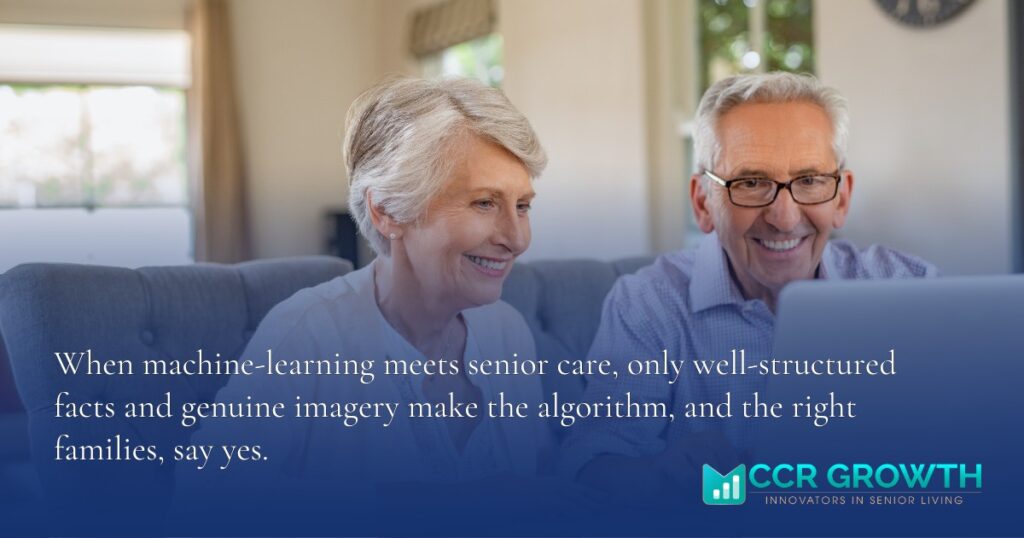
CCR Growth
Google AI Overviews: Full Breakdown and What It Means for Senior Living Search
Google AI Overviews are not just reshaping how users interact with Google Search; they are fundamentally changing how families research senior living communities. This creates immense opportunities – and new challenges – for operators aiming to fill rooms and build trust. But what is an AI Overview exactly? And how do senior living marketing teams make sure their communities remain searchable in the face of no-click Google searches? In this article, we unpack these two important questions and offer up helpful insights into why search remains an important part of your senior living marketing strategy.

Outline
Published on
7/9/2025
What Are AI Overviews?
An AI Overview is a process in which generative AI creates summaries by remixing and validating existing information through a multi-step retrieval-and-verification system.
These systems create new, useful summaries from existing data, synthesizing and verifying content for enhanced search response quality. The result looks something like a paragraph or two at the top of a search page that provides quick, informative answers pulled from a broad range of sources across the web.
While these overviews might improve the user experience and increase engagement for the search engines themselves, they’re also resulting in less clicks to your community’s website. It directly impacts how prospects discover details about senior living options, amenities, and care levels, making it crucial for communities to optimize their digital presence. If not addressed, this may impact your online visibility and lead generation overall. Let’s look at how they function and what this crucial shift signals for the future of senior living marketing and sales.
AI Overviews are responses generated by artificial intelligence which show at the top of certain search results. They aim to address complex queries more efficiently than traditional listings.
These summaries compile information from numerous web pages to present a streamlined, digestible response. Prompts are used to describe and outline the retrieval task, guiding the AI to generate effective query variations for more accurate content retrieval.
How AI Overviews Work
Google applies cutting-edge artificial intelligence to craft these summaries. The process includes a method called “query fan out,” which expands a user’s initial question into related sub-questions. The system then gathers relevant data and condenses it into a single, unified answer. Before presenting the summary, the system also works to confirm the accuracy of the information. This results in a no-click search for the vast majority of searches, making it all the more vital that your digital presence is properly optimized.
Traditional Search vs. AI Search
Traditional search results display a list of blue links that users must browse through – and click into in order to delve into the specific topic of interest. In contrast, AI search presents a summarized answer at the top, reducing the need to click through multiple pages. This shift is significantly changing how users approach search. For senior living operators, this means the first impression of your community’s information just became more crucial than ever, demanding new search methodologies like generative search to improve your content visibility and effectiveness, potentially shortening the path from initial family inquiry to a scheduled tour.
Google’s Generative AI Behind the Scenes
Google’s AI Overviews depend on powerful generative models that process, evaluate, and summarize vast amounts of content nearly instantaneously.
- Google Gemini, a leading model, powers these AI-driven features.
- It enables real-time interpretation of queries within Search Labs.
- The models support deep search and enhance the accuracy of responses.
- These tools continue to evolve as users interact with them more frequently.
At the heart of AI Overviews is Google’s commitment to speed, accuracy, and relevance—fundamentals that transform the way we explore the web.
The Role of the Query Fan Out Technique
The query fan out method enables Google to expand a prospect’s initial question—say, “best memory-care communities in Dallas” or “average cost of assisted living near me”—into multiple related sub-queries. Using this query-based approach, the system classifies intent (explanatory, transactional, or comparative) and taps state data and senior-care resources to choose the most suitable response format.
By mapping these layered questions, AI delivers richer, context-aware answers that help families evaluate care levels, pricing, and amenities in one glance—boosting your chances of being cited if your content is structured and authoritative. This is a unique opportunity for senior living operators to provide comprehensive, trusted answers precisely when families need them most, positioning your community as an immediate solution.
Where You’ll See AI Overviews
AI Overviews already surface across the Google app, Chrome browser, and Android devices—prime real estate when adult children research senior living. In the Google app’s search bar, AI Mode displays expandable boxes above standard results for queries like “independent living with meal plans” or “pet-friendly assisted living.” Appearing here positions your community as a trusted source before users scroll to traditional listings, making meticulous GBP updates and schema markup more valuable than ever. This ‘prime real estate’ in search results is where forward-thinking senior living communities will capture attention and differentiate themselves.
What Senior-Living Prospects Can Expect from AI Mode
When AI Mode is activated, families and referral partners enjoy a more streamlined search journey.
- Concise, care-focused summaries deliver quick clarity on pricing tiers, care levels, and availability—crucial insights without the research overload.
- Embedded media—community photos, virtual-tour clips, and resident-story videos— enrich each answer, helping viewers picture daily life and compare options at a glance. AI Mode even suggests related amenities (e.g., pet-friendly policies or memory-care programs) to spark ideas users may not have considered.
- Hyperlinked sources point directly to provider websites, Google Business Profiles, and regulatory databases, giving prospects one-tap access to deeper details.
- Mobile-first layout keeps information readable and interactive for adult children researching on the go.
Overall, AI Mode curates senior-living data into an accessible, comprehensive package—matching modern browsing habits and shortening the path from initial query to scheduled tour. This translates to more informed prospects, reduced inquiry friction, and a faster pathway to scheduled tours and move-ins.
How Google Lens Integrates with Overviews
Google Lens integrates visual search with AI-generated overviews, offering new ways to interact with digital content. Users can point their camera at an object to receive live responses and assistance from Google Lens.
Visual Queries
Users can snap a photo or take a screenshot, and Lens helps identify the key elements within that image, making the search more visual and intuitive.
Image-Powered Overviews
AI generates a contextual summary based on the contents of the image, delivering relevant insights without needing typed input.
Expanded Discovery
This integration allows Google to respond to both textual and visual queries, expanding the boundaries of what users can discover.
Dynamic Input Options
The feature supports non-traditional inputs, such as photos or handwriting, making search more inclusive, adaptive, and dynamic.
Combining Google Lens with AI Overviews means users gain a multi-dimensional way to search, discover, and learn from both visuals and text.
AI Overviews and Complex Questions
One of the standout features of AI Overviews is their ability to answer complex questions effectively. While traditional search requires users to gather information from several links, AI Overviews aim to compile the ideal answer instantly and in one place.What Makes Overviews Work?
Overviews function by evaluating a range of sites and online sources, cross-referencing insights, and synthesizing them into a high-quality response. The system leverages ranking signals and structured data to prioritize trustworthy, accurate content.The Shift to Agentic Capabilities
Google’s evolving AI features are moving toward agentic behaviors that enable the system to assist users more actively.
- These new features allow AI to complete tasks, not just provide facts, by interpreting intent and delivering actions.
- They help users generate ideas, summarize information, and even draft text based on specific needs or context.
- The shift reduces friction in the user journey by simplifying search tasks and eliminating unnecessary steps.
- It creates more interaction between user input and AI-generated output, turning search into a collaborative process.
As agentic capabilities develop, Google Search begins to look more like an intelligent assistant than a basic query tool.
Deep Search: A New Level in Information Discovery
Deep Search is transforming the way users interact with Google Search by enabling a more thorough exploration of complex topics. Leveraging the power of AI Mode and the innovative query fan out technique, Deep Search analyzes your initial query and automatically expands it into related sub-queries.
This process allows Google to pull in search results from multiple sources, providing a comprehensive overview that helps users answer complex questions in a single session.
With Deep Search, users can explore a topic in greater depth, discovering key information and links that might otherwise be buried in traditional search results. Whether you’re a researcher, student, or professional, this feature streamlines the process of gathering insights from across the web.
By using generative AI, Deep Search delivers concise overviews and direct access to relevant resources, making it easier than ever to find the right answer quickly.
Available in the Google app when AI Mode is enabled, Deep Search is a game-changer for anyone looking to discover, explore, and understand complex subjects. It’s a powerful tool that redefines what’s possible in information discovery, helping users navigate the web with greater efficiency and confidence.
The Role of AI in Information Retrieval for Senior Living
Artificial intelligence now sits at the heart of how families find senior-living information online. Features such as AI Overviews and AI Mode analyze intent behind queries like “memory-care costs in Tampa” or “independent-living versus assisted-living amenities,” then surface precise, context-aware answers. Advanced machine-learning models decode whether a searcher needs pricing guidance, a care-level comparison, or state-licensing data—ensuring the response aligns with real-world decision points.Tools such as Google Lens and Search Live push this further: a prospect can snap a brochure photo and instantly see AI-generated highlights—floor-plan sizes, activity calendars, even recent Google reviews—thanks to computer vision and natural-language processing. Because these results appear at the very top of Google Search, communities with clear imagery, structured data, and up-to-date citations gain valuable visibility.By marrying large-language models with multimedia search, Google has redefined how complex senior-care questions get answered. The outcome? Personalized, authoritative results delivered in seconds—setting new expectations for families, referral partners, and marketers alike. As AI capabilities expand, smarter overviews and richer media will continue raising the bar for information retrieval across the senior-living journey.
Examples of AI in Action for Senior Living
AI Overviews are being tested and refined through real-world senior-living use cases, each showing practical AI power—personalisation, real-time suggestions, and contextual understanding. Providers and marketers can opt into experiments in Search Labs to test new features before wide release. Explore more stories about AI integration in search to stay abreast of the latest developments.
Tour & Move-In Planning
Ask Google to “plan a Friday tour route for three assisted-living communities near Charlotte” and receive a summary with drive times, tour-booking links, and lunch spots for the family. The AI can even pull confirmation emails from Gmail to build a live itinerary.
Content Summarisation
Paste a 2,000-word state licensing update into search and the AI returns a condensed version highlighting new compliance rules—complete with direct links to official sources. Teams can opt to have these summaries delivered straight to their inboxes.
Community Comparison
When families compare providers, Google now serves side-by-side breakdowns of care levels, staffing ratios, contract terms, and starting prices—saving them from opening ten tabs.
Generative Prompts
Marketers can prompt the AI to draft a follow-up email after a tour or create a blog intro on “benefits of respite care,” receiving polished copy in seconds.
These senior-living-specific examples show how AI is rapidly redefining search expectations. Senior living providers and marketers should explore and test these features in Search Labs to gain a first-hand understanding of how to adapt their strategies.
Benefits for Users
AI Overviews give families faster, more accurate answers by leveraging Google’s vast index to surface relevant information without endless clicks. This means senior living providers can benefit from highly qualified prospects who are better informed and closer to a decision. Search becomes discovery-driven rather than page-driven, while built-in summarisation makes research more productive for prospects and providers alike.
Real-Time Updates and Fresh Data
Keeping search results current is a major advantage of AI Overviews for senior living providers.
- The system fetches updates—new reviews, inspection reports, pricing changes, and availability—as soon as they go live, preserving relevance and timeliness.
- Answers stay accurate for queries like “assisted-living costs in Atlanta today” or “latest CMS ratings for memory-care communities.”
- Real-time indexing captures fast-moving items such as regulation changes or incentive offers, giving families timely insights.
- Fresh data maintains trust by reflecting today’s occupancy numbers and event calendars, not last year’s figures.
- AI Overviews thus create a dynamic, living snapshot of the senior-living landscape—provided your listings, schema, and GBP updates keep pace. This demands a proactive, continuous approach to your community’s digital presence to ensure your information is always accurate and compelling.
User Control and Feedback
Google actively incorporates user feedback to refine its AI-powered features, and that feedback now includes families researching senior living.
- Feedback buttons let prospects give a quick thumbs-up or thumbs-down, signalling whether details like care levels or contract terms are on target.
- Accuracy checks route flagged content to internal teams, reducing misinformation about licensing status or fees.
- Personalisation uses feedback to learn what matters most—pet policies, respite care, or nurse-to-resident ratios—tailoring future answers accordingly.
- Transparency keeps sources and links visible, so searchers can verify facts on provider websites, state databases, and Google Business Profiles.
This feedback loop grows smarter over time, making search journeys more helpful for families and giving providers a clearer path to showcase their strengths. For senior living marketers and sales teams, analyzing this feedback can offer invaluable, real-time insights into prospect priorities and pain points, allowing you a chance to refine your outreach.
The Challenges of AI in Senior-Living Search
AI-powered results elevate Google Search, but they introduce several hurdles for communities and their marketing teams. First, accuracy and relevance are mission-critical. An AI overview that misstates licensing status, care levels, or pricing can quickly erode trust with families comparing options. Algorithmic bias is another concern: large national chains may dominate AI summaries, leaving high-quality regional operators under-represented and raising important questions about transparency and accountability.
User privacy also carries weight, as health-related queries and on-site interactions generate sensitive data that must comply with regulations such as HIPAA, GDPR, and POPIA. Maintaining a constant flow of fresh, structured data, reviews, and multimedia so the AI has reliable inputs demands substantial resources—often stretching lean in-house teams.
Finally, workforce dynamics are shifting; as automated summaries handle preliminary Q&A, sales and marketing staff must pivot toward higher-value tasks like virtual tours, personalised follow-ups, and relationship building.
Despite these challenges, the benefits—faster, richer answers and the ability to address complex care questions—are driving continuous refinement. Google and forward-thinking senior-living providers are tackling accuracy, bias, and privacy concerns head-on, ensuring families experience a trustworthy, effective search journey.
How Senior Living Marketers Should Respond
For senior living marketers, responding proactively means anticipating the change in how content is surfaced. Emphasis should be placed on structured data, user-focused answers, and clear formatting. Content that directly addresses family intent – whether for amenities, care, or financial planning – is more likely to be featured in AI Overviews, directly impacting lead quality.How AI Affects Page and Site Strategy
The rise of AI-generated content summaries will influence how senior living communities approach SEO and user engagement.- Featured links can still provide valuable traffic and brand exposure even if fewer clicks occur overall.
- Structured content helps increase chances of being included in overviews by offering clarity and factual accuracy, while concise and factual writing tends to rank higher.
- Concise and factual writing tends to rank higher in AI-generated summaries, making each word count more than ever.
- Establishing authority in your niche improves visibility in AI answers by reinforcing topical expertise and trustworthiness.
The Role of Videos, Images, and Structured Data
Google’s AI rewards multimedia-rich content that includes helpful visuals, accurate facts, and schema markup. This means high-quality virtual tours, engaging resident testimonial videos, and clear community photos are more crucial than ever.
Video content in particular plays a crucial role in enhancing search functionalities and user engagement as prospects can watch these directly within search results, providing a richer content consumption experience that improves the likelihood your site will be included in AI Overviews. These enhancements improve the likelihood that your site will be included in AI Overviews.
Is This the Future of Search?
AI Mode represents a foundational shift. Google is steadily introducing features that don’t just return results—they guide users through tasks. This could evolve into a future where search acts more like a personal assistant than a traditional engine.
Closing Thoughts
Google’s shift toward AI-led search is rewriting the rulebook for senior living marketing. Providers that supply well-structured data, authoritative content, and compelling visuals will see their communities featured in AI Overviews, while those that cling to yesterday’s tactics risk disappearing from view.
The good news? You don’t have to navigate this transformation alone. CCR Growth has helped dozens of senior-living operators secure prime visibility in an AI-driven landscape, turning search impressions into booked tours and steady occupancy growth. Ready to future-proof your digital presence? Contact CCR Growth and start claiming your spot at the top of tomorrow’s search results.
Subscribe to our newsletter
Sharpen your expertise and stay ahead of senior living industry trends—subscribe to CCR Growth’s newsletter for exclusive insights and updates.
Redefining Senior Living Marketing, Sales, and Operations
CONTACT ADDRESS
8710 Carmel Valley Road, Carmel, CA 93923
GENERAL INQUIRIES
info@ccrgrowth.com
833-448-3459
SOCIAL MEDIA






